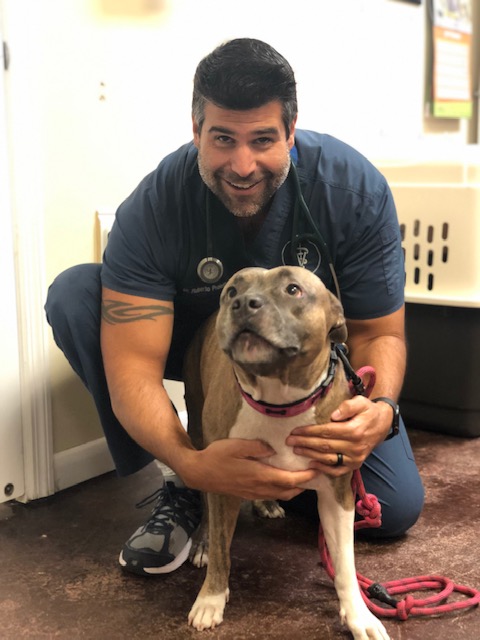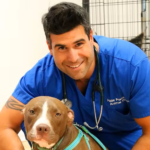For Veterinarians
FidoCure® Precision Medicine for Canine Cancer

Diagnostic
DNA sequencing of your patient’s tumor at a CLIA certified lab
Support
Telemedicine-enabled clinical guidance in conjunction with knowledge of tumor histology
Treatment
Oral targeted treatment access
- DNA sequencing diagnostic in a CLIA certified lab
- Telemedicine-enabled clinical guidance in conjunction with knowledge of tumor histology
- Facilitated access to targeted therapies, FDA approved for humans, via our pharmacy partners
- Administered orally at your clinic or the patient’s home
- Complies with USP 800
Case Study
Gracie: Significant Lesion Reduction
Dr. Robert Proietto, VMD, MS treated Gracie, a 6-year-old American pitbull mix, who was diagnosed with soft tissue sarcoma and thoracic metastasis. After starting FidoCure® enabled targeted therapy, there was a significant reduction in the size of the primary lesion and complete resolution of thoracic metastasis.

Gracie
Significant Lesion Reduction
Differentiate your practice with advanced, personalized canine cancer care.
The options to treat canine cancer are often limited, while pet parents are increasingly willing to do more for their dogs. FidoCure® enables veterinarians to differentiate their practice with advanced, personalized canine cancer care, previously only available for humans.
Human Oncology
Veterinary Oncology
FidoCure Services

DNA Sequencing & Targeted Therapy
- DNA sequencing helps identify the cancer’s mutations to better inform the diagnosis.
- Veterinarians receive a DNA Report and targeted therapy treatment plan.
- FidoCure facilitates access to recommended oral targeted therapies.
- Recommended therapies are FDA-approved and easy to administer at home.
- Offers alternatives to more invasive treatment or a new option when traditional therapies fail.

Therapy Only Service
- Veterinarians receive a Data-Based Report with information about the diagnosis and recommended therapies.
- In cases such as mast cell tumor and transitional cell carcinoma (urothelial carcinoma) that already have widely adopted therapies, veterinarians can choose to receive expedited access to therapy.
- Because many mast cell tumors are c-Kit driven and transitional cell carcinomas are BRAF+, FidoCure facilitates access to a c-Kit targeted therapy or EGFR/HER2 and/or MEK targeted therapy.
- Oral therapies are FDA-approved, easy to administer at home and offer an alternative to more invasive treatment or a new option when traditional therapies fail.
FidoCure® Precision Medicine White Paper
Read an in-depth explanation of FidoCure’s approach to precision medicine, including molecular profiling, biomarkers, and targeted therapy.
Why Offer FidoCure® to Families

Thousands of dogs have benefitted from FidoCure®
when other options were limited

Dr. Aarti Sabhlok DVM,
DACVIM
“It narrows it down a little bit and gives me additional options and sometimes they’re drugs I wouldn’t have thought to use for that particular patient or that particular cancer.”

Dr. Brooke Fowler DVM MS
DACVIM
“FidoCure® is advancing the field of veterinarian oncology by providing the technology to help vet oncologists pinpoint the genetic mutation that may be causing a dog’s cancer and providing treatment alternatives that use the latest advances in human oncology.”

Dr. Rob Proietto
VMD, MS
“All of our cases have done tremendous so far so I am hopeful for a long quality of life ahead.”
Access Our Peer-Reviewed Scientific Paper

FidoCure published at NPJ Precision Medicine, a Nature family publication, showing we can effectively treat dogs with many human cancer treatments, and that FidoCure DNA sequencing helps to predict the cancer journey. In this publication we analyze cancer from 2,000 dogs showing similarity between human and canine journeys.
- Our dataset accurately reflects the known prognosis of canine cancer types from previous studies.
- Our real-world database shows which cancer types have better and worse prognosis: hemangiosarcoma as the worst versus Thyroid carcinoma as the least bad.
- Our dataset reflects some known prognostic factors about mutations in specific genes (e.g. TP53 mutations are worse than mutations in other genes) but also adds unique pan-cancer information about gene-specific prognoses.
- Analysis of mutated gene/targeted therapy combinations on survival (controlling for tumor type effects confirmed our recommendations for Lapatinib for BRAF mutations (mainly driven by Transitional Cell Carcinoma) is effective in prolonging survival.
- In this and our future works, AI will help us to extract phenotypes from medical records, and predict how mutations interact with different drugs.
“We saw an incredible impact by using human drugs to transform canine cancer cure. One out of every 3 dogs will develop cancer in their lifetimes, and by crushing cancer in dogs we are learning important lessons for crushing cancer in humans, too. We’re effectively turning every veterinarian in the US into a protagonist in the future of cancer care—when they treat our canine family members they are simultaneously advancing the discovery of new therapeutics for human cancer.” – One Health CEO Christina Lopes
